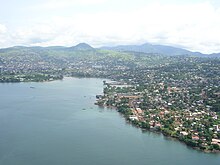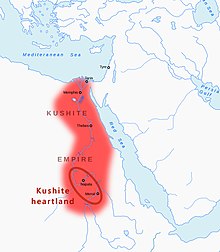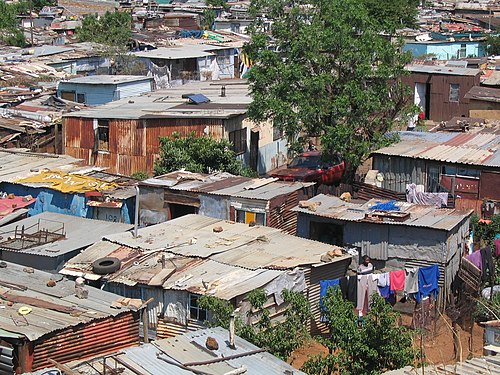Portal:Africa



Africa is the world's second-largest and second-most populous continent after Asia. At about 30.3 million km2 (11.7 million square miles) including adjacent islands, it covers 20% of Earth's land area and 6% of its total surface area. With nearly 1.4 billion people as of 2021, it accounts for about 18% of the world's human population. Africa's population is the youngest among all the continents; the median age in 2012 was 19.7, when the worldwide median age was 30.4. Despite a wide range of natural resources, Africa is the least wealthy continent per capita and second-least wealthy by total wealth, ahead of Oceania. Scholars have attributed this to different factors including geography, climate, corruption, colonialism, the Cold War, and neocolonialism. Despite this low concentration of wealth, recent economic expansion and a large and young population make Africa an important economic market in the broader global context. Africa has a large quantity of natural resources and food resources, including diamonds, sugar, salt, gold, iron, cobalt, uranium, copper, bauxite, silver, petroleum, natural gas, cocoa beans, and.
Africa straddles the equator and the prime meridian. It is the only continent to stretch from the northern temperate to the southern temperate zones. The majority of the continent and its countries are in the Northern Hemisphere, with a substantial portion and a number of countries in the Southern Hemisphere. Most of the continent lies in the tropics, except for a large part of Western Sahara, Algeria, Libya and Egypt, the northern tip of Mauritania, and the entire territories of Morocco, Ceuta, Melilla, and Tunisia, which in turn are located above the tropic of Cancer, in the northern temperate zone. In the other extreme of the continent, southern Namibia, southern Botswana, great parts of South Africa, the entire territories of Lesotho and Eswatini and the southern tips of Mozambique and Madagascar are located below the tropic of Capricorn, in the southern temperate zone.
Africa is highly biodiverse; it is the continent with the largest number of megafauna species, as it was least affected by the extinction of the Pleistocene megafauna. However, Africa also is heavily affected by a wide range of environmental issues, including desertification, deforestation, water scarcity, and pollution. These entrenched environmental concerns are expected to worsen as climate change impacts Africa. The UN Intergovernmental Panel on Climate Change has identified Africa as the continent most vulnerable to climate change.
The history of Africa is long, complex, and varied, and has often been under-appreciated by the global historical community. In African societies, the historical process is largely a communal one, with eyewitness accounts, hearsay, and reminiscences, and occasionally visions, dreams, and hallucinations, crafted into oral traditions and preserved orally. Truth is generally viewed as relativist. Africa, particularly Eastern Africa, is widely accepted to be the place of origin of humans and the Hominidae clade, also known as the great apes. The earliest hominids and their ancestors have been dated to around 7 million years ago, including Sahelanthropus, Australopithecus africanus, A. afarensis, Homo erectus, H. habilis and H. ergaster, the earliest Homo sapiens (modern human) remains, found in Ethiopia, South Africa, and Morocco, date to circa 233,000, 259,000, and 300,000 years ago, respectively, and Homo sapiens is believed to have originated in Africa around 350,000–260,000 years ago. Africa is also considered by anthropologists to be the most genetically diverse continent as a result of being the longest inhabited. (Full article...)
Selected article –
The Twenty-fifth Dynasty of Egypt (notated Dynasty XXV, alternatively 25th Dynasty or Dynasty 25), also known as the Nubian Dynasty, the Kushite Empire, the Black Pharaohs, or the Napatans, after their capital Napata, was the last dynasty of the Third Intermediate Period of Egypt that occurred after the Kushite invasion.
The 25th dynasty was a line of pharaohs who originated in the Kingdom of Kush, located in present-day northern Sudan and Upper Egypt. Most of this dynasty's kings saw Napata as their spiritual homeland. They reigned in part or all of Ancient Egypt for nearly a century, from 744 to 656 BC. (Full article...)Featured pictures –
Did you know (auto-generated) -

- ... that nursing educator Helen Turner Watson was one of the first African-American women to become a commissioned officer in the United States Navy?
- ... that Elaine Estes, the first African American director of the Des Moines Public Library, holds a patent on her parents' barbecue sauce?
- ... that ten years after publishing the book Great South African Christians, Horton Davies gave a speech criticizing South African churches and synagogues for their role in apartheid?
- ... that in 2022, Four Hundred Souls: A Community History of African America was a finalist for both an Andrew Carnegie Medal for Excellence in Nonfiction and an Audie Award for Multi-voiced Performance?
- ... that whilst serving as the Central African ambassador in Paris, Sylvestre Bangui held a press conference confirming that his government had massacred children and resigned?
- ... that scientists tested the age of an African termite's inhabited mound—and found it to be 34,000 years old?
Categories
Selected biography –
Mbaye Diagne (18 March 1958 – 31 May 1994) was a Senegalese military officer who served in Rwanda as a United Nations military observer from 1993 to 1994. During the Rwandan genocide, he undertook many missions on his own initiative to save the lives of civilians.
Diagne was born in Senegal. After graduating from the University of Dakar, he enrolled in the Senegalese Army's École Nationale des Officiers d'Active. He completed his schooling the following year and eventually attained the rank of captain. He was given command of the 3rd Company of the 6th Infantry Battalion and fought in the Casamance conflict from 1989 to 1993. (Full article...)Selected country –
 |

|
|

| ||
Botswana, officially the Republic of Botswana (Tswana: Lefatshe lo Botswana), is a landlocked nation in Southern Africa. Citizens of Botswana are Batswana (singular: Motswana), regardless of ethnicity. Formerly the British protectorate of Bechuanaland, Botswana adopted its new name after becoming independent within the Commonwealth on 30 September 1966. Bordered by South Africa to the south and southeast, Namibia to the west, Zambia to the north, and Zimbabwe to the northeast, it is divided into nine districts, which are further subdivided into a total twenty-eight subdistricts.
For over 30 years, Botswana had the fastest growing economy in the world, with growth averaging over 9% per year from 1966 to 1999. The economy, closely tied to South Africa's, is dominated by mining (38 percent), services (44 percent), construction (7 percent), manufacturing (4 percent) and agriculture (2 percent). Botswana has been hit very hard by the AIDS epidemic; the average life expectancy in Botswana at birth has declined from 64 years in 1990 to 50.6 years in 2007. (Read more...)
Selected city –

Freetown is the capital and largest city of Sierra Leone. It is a major port city on the Atlantic Ocean and is located in the Western Area of the country. Freetown is Sierra Leone's major urban, economic, financial, cultural, educational and political centre, as it is the seat of the Government of Sierra Leone. The population of Freetown was 1,347,559 as of the 2024 census.
The city's economy revolves largely around its harbour, which occupies a part of the estuary of the Sierra Leone River in one of the world's largest natural deep water harbours. (Full article...)In the news
- 12 February 2024 –
- Two boats collide on the Congo River near Kinshasa, Democratic Republic of the Congo; with the death toll remains unclear. (AP)
- 11 February 2024 – 2023 Africa Cup of Nations
- In association football, hosts Ivory Coast win their third Africa Cup of Nations by defeating Nigeria 2–1 in the final. Sébastien Haller scores the winning goal in the 81st minute. (The Guardian)
- 10 February 2024 – Somali civil war
- Four Emirati soldiers and a Bahraini military officer are killed, while ten other people are injured, when a soldier opens fire at a military base in Mogadishu, Somalia, before being killed in the ensuing shootout. Al-Shabaab claims responsibility. (AP)
- 10 February 2024 –
- A Eurocopter EC130 helicopter crashes near Nipton, California, United States, killing all the six people on board, including Nigerian banker Herbert Wigwe. (CBS News)
- 10 February 2024 – 2023–2024 Senegalese protests
- Violent protests occur in Senegal following an announcement by President Macky Sall that presidential elections have been delayed from February 25 to December 15. (Sky News)
- 9 February 2024 –
- At least 18 people are killed during a collision between a bus and a truck on a road in Kinshasa, Democratic Republic of the Congo. (AP)
Updated: 16:33, 14 February 2024
General images -
Africa topics
More did you know –

- ... that the British Museum's oldest African-American object is the Akan Drum (pictured) that was used to "dance the slaves"?
- ... that L.C. Lecesne rose to prominence as an activist against slavery after the British Government compensated him for his illegal exile from Jamaica?
- ... that despite receiving a budget allocation in 2003, the public sports stadium in Gibeon, Namibia, hadn't been repaired as of December 2007?
- ... that Thomas Edward Wilkinson was made Bishop of Zululand after his predecessor in South Africa, John Colenso, was excommunicated?
Related portals
Major Religions in Africa
North Africa
West Africa
Central Africa
East Africa
Southern Africa
Associated Wikimedia
The following Wikimedia Foundation sister projects provide more on this subject:
-
Commons
Free media repository -
Wikibooks
Free textbooks and manuals -
Wikidata
Free knowledge base -
Wikinews
Free-content news -
Wikiquote
Collection of quotations -
Wikisource
Free-content library -
Wikispecies
Directory of species -
Wikiversity
Free learning tools -
Wikivoyage
Free travel guide -
Wiktionary
Dictionary and thesaurus
























































































